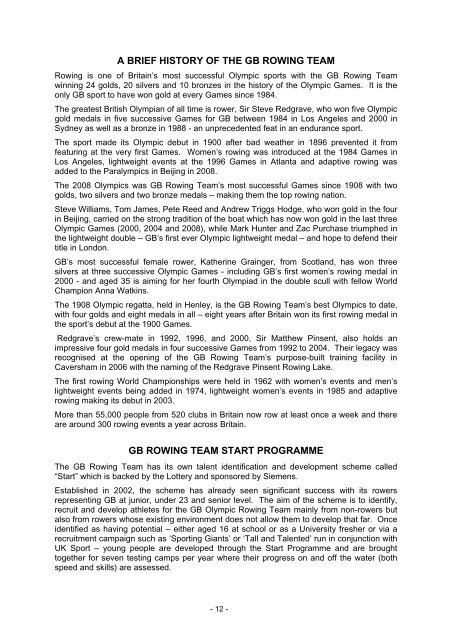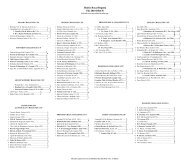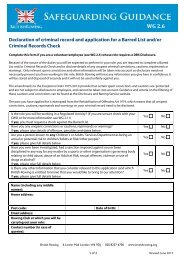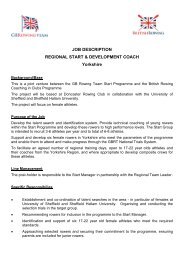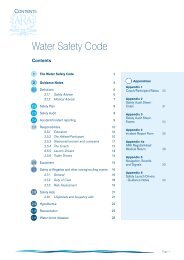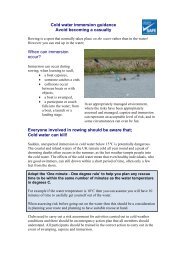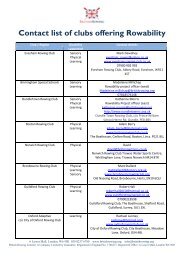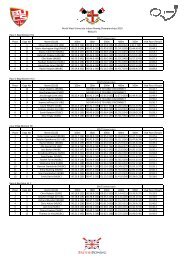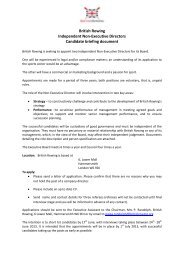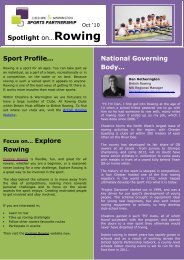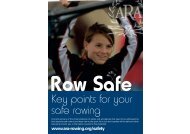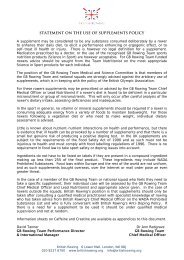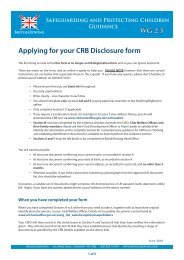2011 World Rowing Championships Press Pack - British Rowing
2011 World Rowing Championships Press Pack - British Rowing
2011 World Rowing Championships Press Pack - British Rowing
You also want an ePaper? Increase the reach of your titles
YUMPU automatically turns print PDFs into web optimized ePapers that Google loves.
A BRIEF HISTORY OF THE GB ROWING TEAM<br />
<strong>Rowing</strong> is one of Britain’s most successful Olympic sports with the GB <strong>Rowing</strong> Team<br />
winning 24 golds, 20 silvers and 10 bronzes in the history of the Olympic Games. It is the<br />
only GB sport to have won gold at every Games since 1984.<br />
The greatest <strong>British</strong> Olympian of all time is rower, Sir Steve Redgrave, who won five Olympic<br />
gold medals in five successive Games for GB between 1984 in Los Angeles and 2000 in<br />
Sydney as well as a bronze in 1988 - an unprecedented feat in an endurance sport.<br />
The sport made its Olympic debut in 1900 after bad weather in 1896 prevented it from<br />
featuring at the very first Games. Women’s rowing was introduced at the 1984 Games in<br />
Los Angeles, lightweight events at the 1996 Games in Atlanta and adaptive rowing was<br />
added to the Paralympics in Beijing in 2008.<br />
The 2008 Olympics was GB <strong>Rowing</strong> Team’s most successful Games since 1908 with two<br />
golds, two silvers and two bronze medals – making them the top rowing nation.<br />
Steve Williams, Tom James, Pete Reed and Andrew Triggs Hodge, who won gold in the four<br />
in Beijing, carried on the strong tradition of the boat which has now won gold in the last three<br />
Olympic Games (2000, 2004 and 2008), while Mark Hunter and Zac Purchase triumphed in<br />
the lightweight double – GB’s first ever Olympic lightweight medal – and hope to defend their<br />
title in London.<br />
GB’s most successful female rower, Katherine Grainger, from Scotland, has won three<br />
silvers at three successive Olympic Games - including GB’s first women’s rowing medal in<br />
2000 - and aged 35 is aiming for her fourth Olympiad in the double scull with fellow <strong>World</strong><br />
Champion Anna Watkins.<br />
The 1908 Olympic regatta, held in Henley, is the GB <strong>Rowing</strong> Team’s best Olympics to date,<br />
with four golds and eight medals in all – eight years after Britain won its first rowing medal in<br />
the sport’s debut at the 1900 Games.<br />
Redgrave’s crew-mate in 1992, 1996, and 2000, Sir Matthew Pinsent, also holds an<br />
impressive four gold medals in four successive Games from 1992 to 2004. Their legacy was<br />
recognised at the opening of the GB <strong>Rowing</strong> Team’s purpose-built training facility in<br />
Caversham in 2006 with the naming of the Redgrave Pinsent <strong>Rowing</strong> Lake.<br />
The first rowing <strong>World</strong> <strong>Championships</strong> were held in 1962 with women’s events and men’s<br />
lightweight events being added in 1974, lightweight women’s events in 1985 and adaptive<br />
rowing making its debut in 2003.<br />
More than 55,000 people from 520 clubs in Britain now row at least once a week and there<br />
are around 300 rowing events a year across Britain.<br />
GB ROWING TEAM START PROGRAMME<br />
The GB <strong>Rowing</strong> Team has its own talent identification and development scheme called<br />
“Start” which is backed by the Lottery and sponsored by Siemens.<br />
Established in 2002, the scheme has already seen significant success with its rowers<br />
representing GB at junior, under 23 and senior level. The aim of the scheme is to identify,<br />
recruit and develop athletes for the GB Olympic <strong>Rowing</strong> Team mainly from non-rowers but<br />
also from rowers whose existing environment does not allow them to develop that far. Once<br />
identified as having potential – either aged 16 at school or as a University fresher or via a<br />
recruitment campaign such as ‘Sporting Giants’ or ‘Tall and Talented’ run in conjunction with<br />
UK Sport – young people are developed through the Start Programme and are brought<br />
together for seven testing camps per year where their progress on and off the water (both<br />
speed and skills) are assessed.<br />
- 12 -


